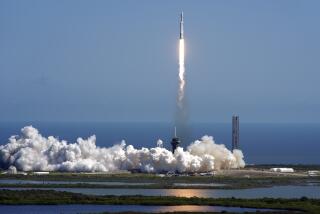Shuttle Dips to Low Orbit for Final Test of Mission : Space: Experiment on oxygen atoms ends troubled science flight. Landing set for Saturday in Florida.
- Share via
KENNEDY SPACE CENTER, Fla. — With their troubled mission being called a technical success, the Atlantis astronauts Thursday dropped their space shuttle into an orbit just 124 miles high to sample the Earth’s ionosphere.
Once at the new altitude--lower by 40 miles--the spacecraft pirouetted to fly with its open cargo bay facing forward, allowing an array of instruments to collect free atoms of oxygen for studies of their effects on a variety of materials.
The 40-hour exercise, carried out mainly with automated equipment, will be the last for an eight-day shuttle flight that has lived up to all warnings of its difficulty. Atlantis is scheduled to land here early Saturday without accomplishing its foremost objective: a plan to reel a tethered satellite out to a distance of 12.5 miles and make the linked vehicles into an electrical generator. That effort was abandoned Wednesday after the tether jammed with the satellite only about 750 feet from the shuttle.
Flight director Ron Dittemore on Thursday defended the decision to not try again after the jammed line was finally jerked free.
The problems in tether control equipment, he said, were “multiple in nature” and not understood by experts in Mission Control, leading officials to conclude the only prudent course was “to retrieve it and call it a day.”
Scientists, seeing possibly their only chance to carry out experiments envisioned for decades, were said to have agreed that the chances of success had become remote.
Mission scientist Nobie Stone of the Marshall Space Flight Center in Huntsville, Ala., said the experience left experimenters “more convinced than ever that the tethered system gives us a valuable tool. Given the opportunity, we will be ready for another mission.”
In spite of failing on the priority science project of the mission, astronauts and mission controllers were pleased that they were able to recover the $191-million satellite belonging to the Italian Space Agency.
Dittemore said the Atlantis crew was “elated,” because there had been “a very real possibility that it would be left in orbit.”
National Aeronautics and Space Administration officials had been concerned that capturing the satellite for return to Earth might prove hopeless.
Initially, the flight of Atlantis was to have ended with a landing at Kennedy Space Center today, but a 24-hour delay last week in releasing the European Space Agency’s EURECA laboratory caused the mission to be extended by a day.
The orbiter is now due to touch down at Kennedy Space Center at 4:39 a.m. PDT Saturday.
Favorable weather is forecast both at the space center and at the backup landing site, Edwards Air Force Base in California.
As soon as the mission is completed, the tether hardware will be dismantled to determine what went wrong. NASA formed a special team Thursday to investigate the problem in the deployment system, which was built by Martin Marietta Corp. The Marshall Space Flight Center has ordered records in connection with the tether program impounded, a Martin Marietta spokesman said.
Just minutes before the shuttle moved to its lower orbit Thursday, the EURECA microgravity laboratory was finally transferred into a higher orbit. That sets the stage for it to be recovered on a shuttle mission next spring.
The transfer, which was supposed to have taken place last Sunday, was aborted when European Space Agency controllers in Darmstadt, Germany received indications that the free-flying satellite was on an errant course.
The problem was traced to a faulty computer command. A new command at 2:27 a.m. Thursday raised its orbit by 50 miles, to 280 nautical miles.
Had the lab been stranded at the lower altitude, it might have drifted down to a point where a shuttle recovery next spring would have been unsafe.
“We have a perfectly healthy spacecraft,” an ESA spokesman said Thursday. “It is responding to all commands.”
More to Read
Sign up for Essential California
The most important California stories and recommendations in your inbox every morning.
You may occasionally receive promotional content from the Los Angeles Times.













